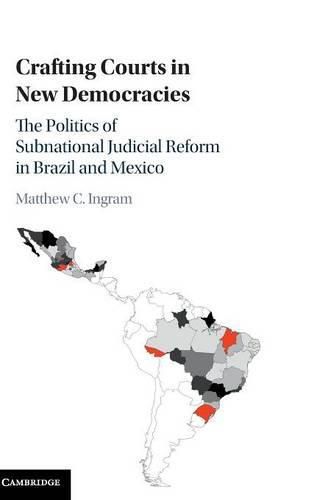Readings Newsletter
Become a Readings Member to make your shopping experience even easier.
Sign in or sign up for free!
You’re not far away from qualifying for FREE standard shipping within Australia
You’ve qualified for FREE standard shipping within Australia
The cart is loading…






The role of Latin American courts in facilitating democracy and economic liberalization is considerable. But while national ‘high courts’ have been closely studied, the form, function, and empowerment of local courts are still not well understood. In Crafting Courts in New Democracies, Matthew C. Ingram fills this gap by examining the varying strength of local judicial institutions in Brazil and Mexico since the 1980s. Combining statistical analysis and in-depth qualitative research, Ingram offers a rich account of the politics that shape subnational court reform in the region’s two largest democracies. In contrast to previous studies, theoretical emphasis is given to the influence of political ideas over the traditional focus on objective, material incentives. Exhaustively researched and rigorously presented, this book will appeal to scholars and policymakers interested in the judiciary, institutional change, Latin America, the causal role of ideas, justice reform, and the rule of law.
$9.00 standard shipping within Australia
FREE standard shipping within Australia for orders over $100.00
Express & International shipping calculated at checkout
The role of Latin American courts in facilitating democracy and economic liberalization is considerable. But while national ‘high courts’ have been closely studied, the form, function, and empowerment of local courts are still not well understood. In Crafting Courts in New Democracies, Matthew C. Ingram fills this gap by examining the varying strength of local judicial institutions in Brazil and Mexico since the 1980s. Combining statistical analysis and in-depth qualitative research, Ingram offers a rich account of the politics that shape subnational court reform in the region’s two largest democracies. In contrast to previous studies, theoretical emphasis is given to the influence of political ideas over the traditional focus on objective, material incentives. Exhaustively researched and rigorously presented, this book will appeal to scholars and policymakers interested in the judiciary, institutional change, Latin America, the causal role of ideas, justice reform, and the rule of law.